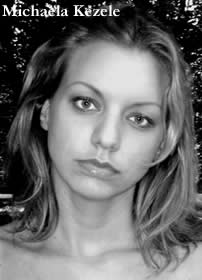 Michaela Kezele was born in Munich. Her Mother is Serbian, her father
Michaela Kezele was born in Munich. Her Mother is Serbian, her fatherCroatian. She was raised by her grandparents in Dubrovnik. As a result
of the war, she came back to Munich in 1991. After graduating from
high-school, she studied for two years at the music academy and
graduated in 1997 with a diploma in acting.. After graduation,
she worked in Germany and Croatia as an actress. Now, she is a student
at the film & television academy in Munich. Milan is Michaela’s third short film made during her film school years.
Milan takes place during the 1999
Nato air-raids in Yugoslavia. Milan, a six year old boy, and his 19
year old brother Ognjen live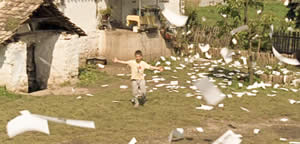 with their parents in a small village
with their parents in a small village
not very far from Belgrad. Despite the daily air-strikes, the family
tries to live a normal life. Ognjen promises his little brother that he would
play “hide and seek” in the afternoon and Milan gets to the meeting point
in the forest on time. He is completely unaware of the fact that his
older brother had an accident and is fighting for his life in the
hospital. While Ognjen is struggling to survive, Milan starts looking
for him, but instead of finding his brother, he finds someone else: an
American pilot hiding in the woods after his plane went down…
Milan
describes the impossible attempt of a family to avoid the every-day
horror of the war. It is a personal story in the shadows of the
anonymity and obscurity during war-time.
 Cinema Without Borders: Tell us a little bit about yourself.
Cinema Without Borders: Tell us a little bit about yourself.
Michaela Kezele:
I was born in Munich. My father is from Croatia and my mother is from
Serbia. They came to Munich when they were very young. They came here
to earn some money. I was born here but I grew up in Croatia with my
grandparents. I came back to Munich when the war began in 91’ in
Yugoslavia. I came back to my parents with my two brothers. I went to
acting school, and was in a high school for music for two years. I also
worked as an actress in Croatia for a longer time, and after that I
started film school here in Munich. Now I am trying to make my first
feature film. That is my whole story.
CWB: When did you come up with the idea of Milan? Why did you decide to make it? 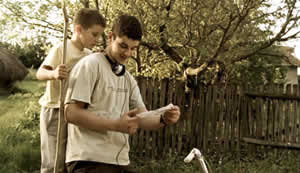
Michaela: I came up with the
idea in 1999 when the NATO Bombing began in Yugoslavia. When the
bombing began I looked at the media and what they were saying about the
war, and what my family and friends were saying. For me
it was interesting to see what the media was saying and what the
realistic facts about war were. Is it really okay that we have a war and have people
who are shooting each other? Is this just life? Like I live in Munich,
and you live in Los Angeles. Imagine if a 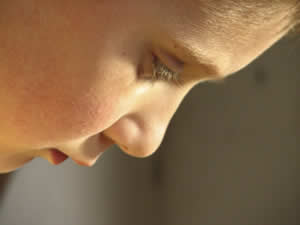 war began in Los Angeles.
war began in Los Angeles.
What would happen there? Are you changing or do you just live your
life. That is what was interesting about this; I wanted to know what
was happening to the people living there. I also wanted to know what
was happening with the media. I went to Belgrade and talked to many
people and saw the banners that were written saying “This is not a
war.” Everything in the film was straight from the people and what they
told me.
CWB: How did you come up with the characters? Are they based on real people you know? 
Michaela: No, I made the characters for the story, and then looked for actors.
CWB: Are all the people acting in the film professional actors? Are there any ordinary people as well?
Michaela: We
have two ordinary people. We have little Milan (Andrija Nikcevic). It
is his first part in a film, I found him in a Childrens Acting School in
Belgrade. There are a few little parts as well. There was a bus driver
who had a great face and I asked him to act for us and he stayed there
for the whole day. All the others are actors in Serbia.
 CWB: Was this your first experience as a film director?
CWB: Was this your first experience as a film director?
Michaela: No
this is my third film school film as a director. I made two films
before this and this is my last short film at the film school because
now I am preparing another story. I wanted to mention one more thing
about the story; when I was there I heard about a American pilot with
an F117 who really dropped down on Belgrade. There were village people
looking for him to kill him. I asked a little boy in the village what
he would do if he found him and he said “I think I would hide him.” It
was so great to see a little boy born after the war who wasn’t part of
it. After this I came up with the idea to have a boy who hides the
pilots in the film.
CWB: Do you think that, with making this film, you took a side in the war?
Michaela:
My intention was not to take a side in the war. I didn’t want to take a
side because I am not there to take sides. To me everyone is the same.
My wish was to show people that every human decides for themselves what
was to show people that every human decides for themselves what
is good and what is not. It can’t be said that all Serbs are bad or all
Americans or all Iraqis are bad, because this is not true. This cannot be
true; this cannot be decided because of one’s religion or because of
one’s nationality. Not all the people are the same there. Everyone can decide
for themselves. This is the message I would like to show people
with “Milan.”
 CWB: Your film is one of the
CWB: Your film is one of the
very first from Serbia which shows the life in Serbia during the war. Other films just
showed the violence of the war, and not how ordinary people suffered
during the war.
Michaela:
It was so interesting there. I kept thinking what if a war broke out in
Germany today. What would happen? Would you go to film school? Would
you go to your job? Would you stay at home because a war had begun? I
thought that maybe nothing would change. It’s just war and you have to
somehow handle it. For me it was interesting because I hadn’t seen all
these documentaries.
CWB: What is your next project?
Michaela:
I am planning to do a story in Germany. I mentioned that my mother is
Serbian and my father is Croatian–well this story is about two people
from the former Yugoslavia: a Serbian man and a Croatian woman. It’s a story
the former Yugoslavia: a Serbian man and a Croatian woman. It’s a story
about war enemies who meet 15 years later and the question is if there is
a way to tolerate each other after all that happened a long time ago.
 CWB: What is the title of the film?
CWB: What is the title of the film?
Michaela: The Working Title is “Revenge”
CWB: Have you decided on the actors yet?
Michaela: No. I am still writing at the moment.
CWB: Who are the filmmakers you admire?
Michaela: When
I was fifteen I saw a film that changed me. It was by Emir Kusturica
and it was called “The time of the Gypsies.” I was very young and I had
never thought about making movies but the music and the actors gave me
this feeling. Something happened to me that day, and I still remember
the moment, where I was and what was on the television. There was
something very special that happened. After this I was looking for this
feeling again, and maybe this is why I chose this path over being an
actor, or music. I chose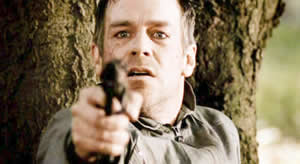 making movies where you can put all these
making movies where you can put all these
things together. I like the early films of Kusturica that I like very
much. I also like films from Pedro Almodovar. They are the two that I
would say now, but there are many beautiful films I have seen. I also
like a movie called “The Life of the Others.” It is made by a student
from the Munich film school as well. I like films that give me
something; films that give me feelings, and change something in 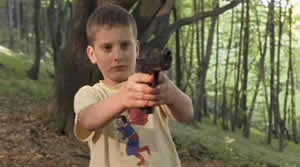 me. That is
me. That is
what I would like to give people with my films.
CWB: How do you feel about receiving the Cinema Without Borders Best International Film Award at the Palm Springs Short Fest 2007?
Michaela: I
feel great because of the title of the award. When you say something
like the Cinema Without Borders Best International Film Award, I feel that
my film was understood. They knew where I was trying to go with this
film.
CWB: Exactly! You want to go beyond borders and tell your story.
Michaela: Yes, no borders; we are all the same somehow. We are all humans.
Michaela Kezele
Filmography
2003 Songcontest (Shortfilm, b/w, 7 min)
2004 I love you (Shortfim)
* Studio Hamburg Talents Award 2004
2005 Nine (Featurefilm in episodes of the vintage 2001, University of Television and Film Munich, 98 min)
* Nominate for the german Artfilmprize, Filmfestival Mannheim
* Openingfilm of the Munich International Festival of Film Schools
2005
2006-7 Milan ( Shortfilm, 22min) completation year 2007
* Supportingprize of the Robert Bosch Fondation, Germany
* Grand Prix, Filmfestival Tampere, Finland 2007
* People`s Choice Award, Festival Sehsüchte, 2007
* Nominate for the STUDENT ACADEMY AWARD (Honorary Foreign Film)
* Winner of Cinema Without Borders “Best International Film Award” at Palm Springs ShortFest 2007.

